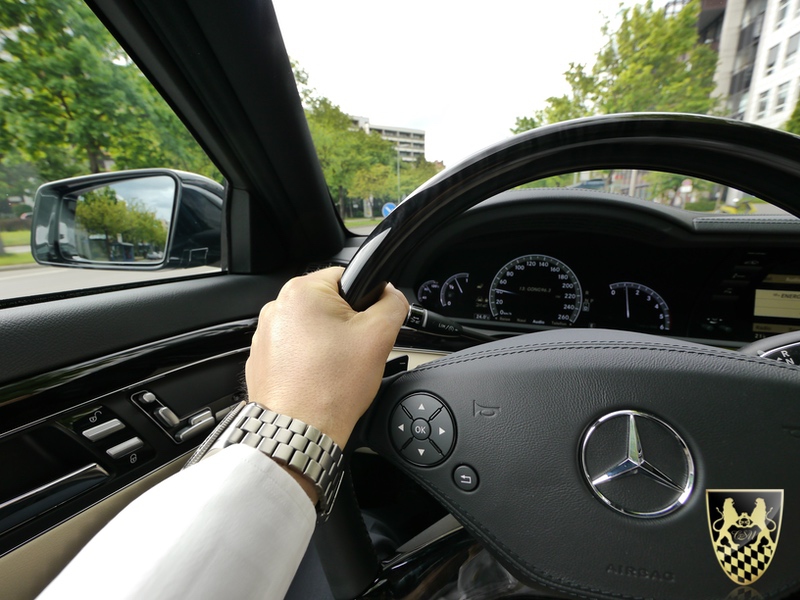The chauffeur ensures that your passengers reach their destination safely and comfortably at all times. The chauffeur service includes the transport of passengers and is subject to certain legal regulations, such as the Passenger Transport Act. In this article, you will find out what requirements you should fulfil as a chauffeur, what your daily tasks will be and what salary is customary in this profession.

The chauffeur
A chauffeur (female in Switzerland: chauffeuse) is a person whose job is to transport others in a passenger car. This can take the form of a company car driver, a taxi driver or a driver for private or business customers. The difference to professional drivers is that the profession of chauffeur is not a state-recognised profession. In Switzerland, Austria and Bavaria in particular, the term ‘chauffeur’ is often used for drivers who drive public transport vehicles such as buses. Here, in contrast to the rest of the German-speaking world, the term ‘Buschauffeur’ is used instead of ‘bus driver’.
A professional chauffeur service is characterised by many years of experience and dedication. In Munich and the surrounding area, this service is offered for business events as well as for airport transfers and journeys home. The professionalism of a chauffeur stands for sovereignty and discretion, which invites potential customers to try out the personalised and individual service.

Historical development
Originally, the chauffeur followed in the footsteps of the coachman when the first passenger cars were used. The chauffeur was in the service of individuals, companies or government agencies and not only drove but also maintained the vehicles. As the early cars were much more maintenance-intensive than modern vehicles, many chauffeurs were also trained as mechanics.
Important qualifications and characteristics
A professional demeanour and a well-groomed appearance are essential for a chauffeur, especially when official events or journeys for business people and politicians are on the agenda. Today, however, the focus of the work is on safe and discreet transport, while maintenance work is usually carried out by specialised professionals.
Tasks in the everyday life of a chauffeur
Daily tasks include driving passengers safely, keeping to schedules and maintaining the vehicles. A professional chauffeur service also provides specialised services, such as dropping off cars at large events and bringing customers home safely, especially if they have consumed alcoholic beverages. In addition, a chauffeur often has to react to spontaneous changes, such as diversions or changes in passengers’ plans. Flexibility and local knowledge are just as important as social skills in dealing with different personalities.
Salary of a chauffeur
The salary can vary greatly depending on the type of employment and the region. A chauffeur working for private individuals or companies can usually expect a higher salary than taxi drivers. The type of client, e.g. high-ranking business people or politicians, can also have an influence on the salary.
What is a chauffeur?
A chauffeur, often referred to as a company car driver, is a professional person who takes passengers safely and comfortably to their destinations. Unlike taxi drivers, who transport various guests within a short period of time, chauffeurs usually look after a fixed individual or a specific group of people. Their assignments include both short and long-distance journeys, and they often act on behalf of companies or private individuals.
Additional tasks
In addition to driving, a chauffeur often takes on additional tasks such as running errands or running errands for their employer. They keep the company vehicle clean and ready for use at all times and in some cases also take care of minor maintenance work. This ensures that the vehicle is always ready to transport passengers comfortably and without delays.
Service orientation and customer care
Chauffeurs are characterised by a high degree of service orientation. They help their passengers get in and out of the vehicle and are often responsible for loading and unloading luggage. In some cases, they even transport luggage to the customer’s home or hotel. This high level of service sets chauffeurs apart from ordinary taxi drivers.
Planning and discretion
One of the key tasks of a chauffeur is to plan the route precisely. Before every journey, the chauffeur gets an overview of the route to ensure that there are no unforeseen complications, even in unfamiliar places. Discretion plays a particularly important role when travelling on business and during airport transfers, as chauffeurs often come into contact with their passengers’ confidential information. Professional and discreet behaviour is therefore of great importance, especially when picking up and transferring to the airport.
Etymology
Etymologically, the word ‘chauffeur’ comes from the French and originally means ‘stoker’. It is derived from the French verb ‘chauffer’, which translates into German as ‘to warm’ or ‘to heat’. This in turn goes back to the late Latin word ‘calefare’. Originally, the term referred to a train driver who worked as both a stoker and a mechanic. The word was later adopted into German and Germanised as ‘Schofför’.

The workflow of a chauffeur
The work of a chauffeur or driver begins with a thorough check of the service vehicle. Before the customer gets in, the chauffeur ensures that the vehicle is roadworthy. This includes checking the tyre pressure and fuel level, checking that the vehicle lights are working properly and looking at the cockpit display to identify any error messages. If necessary, the passenger compartment is cleaned again to ensure that everything is in perfect condition.
Importance of experience and route planning
Experience plays a key role in working efficiently as a chauffeur and always providing a reliable service. After picking up the customer, the chauffeur drives them to their desired destination. The route has already been carefully planned in advance, taking into account possible delays such as detours. In this way, the chauffeur ensures that the passenger reaches their destination on time and stress-free.
Flexibility during the journey
Once at the destination, the chauffeur either waits for the customer to return or drives to another destination in the meantime. In the event of longer waiting times, the chauffeur takes the opportunity to have any necessary maintenance work, such as an oil change, carried out in a workshop – provided there is enough time before the customer is picked up.
At the end of the working day
At the end of the working day, the vehicle is returned to the employer’s depot or garage. When on call, the chauffeur often takes the vehicle home so that it is always ready for use. Before the vehicle is finally parked, the driver checks it again for possible damage and cleans the passenger compartment to prepare it for the next assignment. Chauffeurs are always prepared for all eventualities and are on hand to support the customer in many ways.
Industries in which a chauffeur can work
Chauffeurs are mainly employed by service companies that offer limousine services. Drivers also often find jobs with large companies that want to relieve board members or managing directors by transporting them safely and comfortably. Furthermore, chauffeurs are also in demand among wealthy private individuals, where they often drive the employer’s entire family. There are also employment opportunities for company car drivers in the public sector, especially in ministries and administrations. Here, chauffeurs are responsible for transporting high-ranking individuals such as ministers, state secretaries or members of parliament.
Typical working environments
A chauffeur’s main workplace is the vehicle. He spends most of his time behind the wheel, on the road. In addition to driving, they often spend time in garages or workshops to maintain and service the company vehicle. A chauffeur who is on call also spends time in their home or at a service centre while waiting for assignments.
Chauffeurs working for international clients sometimes stay in hotels when the passenger is travelling on business or has meetings in distant cities or countries. In such cases, the chauffeur is often also accommodated in the hotel in order to be available quickly in the event of last-minute changes or early departures. When processing personal data, including the address, chauffeurs must comply with data protection regulations. This data is only collected and processed within the framework of legal requirements and for the purpose of organising journeys.

Working hours
Chauffeurs rarely have regular working hours, as these depend heavily on the employer’s requirements. Working hours are best planned for companies that require drivers for their management. As a rule, chauffeurs in such companies have weekends off.
Drivers who work for limousine services often work in shifts, which means that they also have to work at weekends, at night and on public holidays. Chauffeurs who work for wealthy private individuals, on the other hand, usually have less predictable working hours. On the other hand, these jobs often have longer idle periods and more flexible holiday options.
Part-time work is difficult to realise in this occupational field. It is most likely to be possible with companies that offer chauffeur services for various companies. In general, the work-life balance and the compatibility of career and family is a challenge for chauffeurs.
Different types
Chauffeure lassen sich am besten nach ihrem jeweiligen Arbeitgeber unterscheiden. Der Chauffeur für Privatpersonen sind in der Regel speziell geschult. Neben ihren Fahrdiensten verfügen sie häufig über Kenntnisse in Erster Hilfe und teilweise im Personenschutz, insbesondere wenn sie bedeutende Persönlichkeiten befördern. Ihre Arbeitszeiten sind flexibel und orientieren sich an den Bedürfnissen des Kunden.
Chauffeurs who work for large companies usually have regular working hours and drive a manageable number of people. Drivers in limousine services, on the other hand, transport many different passengers and above all need excellent local knowledge in order to find their way around the company’s regional environment.
Temporary Management Board Driver I Safety Driver in Munich
Salary
Das durchschnittliche Gehalt des Chauffeur oder einer Chauffeurin liegt bundesweit bei etwa 2.229 EUR brutto im Monat. Nordrhein-Westfalen ist das Bundesland mit den höchsten Löhnen, wo das durchschnittliche Monatsgehalt bei 3.205 EUR brutto liegt. Am unteren Ende der Gehaltsskala stehen Chauffeure in Mecklenburg-Vorpommern, die dort im Schnitt 2.518 EUR brutto pro Monat verdienen. Diese Werte basieren auf einer Vollzeitstelle mit 40 Stunden pro Woche (Quelle: gehaltsvergleich.com, Stand: Mai 2024).
There are no binding collective agreements or standardised salary regulations for chauffeurs. The individual salary depends heavily on the respective area of work and employer. Drivers who work for wealthy private individuals generally earn more than drivers who are employed by a service company. However, working hours at companies are often easier to plan and there are fewer on-call duties. Chauffeurs who have additional qualifications such as first aid skills or personal protection have the opportunity to demand a higher salary.
Chauffeurs who work for limousine services often also benefit from tips, as they regularly transport different passengers. In contrast, tips are rather rare for company or private drivers.
Qualifications and skills
Necessary training
The profession of chauffeur is not a classic apprenticeship. In order to work as a chauffeur, a passenger transport licence is required, which can be applied for from the age of 21. To apply to the relevant driving licence authority, you must submit your driving licence, a medical and ophthalmological certificate, a performance psychology examination and a certificate of good conduct. Proof of local knowledge is also required. The costs for the passenger transport licence vary depending on the region, but are usually in the low three-digit range. Completing training as a professional driver can provide a good introduction to the profession of chauffeur, as it provides additional knowledge in areas such as first aid and vehicle maintenance.
Further skills
Chauffeurs work extremely precisely and responsibly. They adhere strictly to the Highway Code and always have a friendly and professional demeanour towards their passengers. An important skill is to recognise the needs of passengers – whether they want a conversation or prefer peace and quiet and time to work. They need at least a class B or BE driving licence and should have basic technical knowledge to be able to carry out minor maintenance work on the vehicle themselves. They are also characterised by a strong sense of direction and can quickly find their way around new or unfamiliar areas. They not only rely on navigation systems, but are also proficient in manual navigation with maps.
Soft Skills
Chauffeurs can cope with irregular working hours without any problems and always look after their passengers in a courteous and polite manner. They are sociable, helpful and have a strong sense of service. In stressful or critical driving situations, they remain calm and always act prudently to ensure the safety of their passengers. A chauffeur is also characterised by punctuality, reliability and a sense of responsibility, as they are not only responsible for their passengers, but also for the items being transported and the vehicle.
Bus hire for 8 people with driver
Advantages of the Chauffeur Service and Limousine Service in Munich
At Chauffeur and Limousine Service in Munich, our focus is not only on finding you a suitable job that matches your qualifications and skills. We attach great importance to providing you with optimal working conditions as a chauffeur so that you can realise your full potential in your job.
What does a company car driver do?
A company car driver transports a fixed, selected group of people in a high-quality vehicle. In contrast to a taxi driver, company car drivers offer a higher standard of service. Working hours are based on the needs of the employer. Company cars are often more luxuriously equipped and often have extras such as partition windows and intercom systems to ensure that passengers are kept quiet if necessary.
Earnings with a chauffeur service
Der durchschnittliche Monatsverdienst liegt in Deutschland bei etwa 2.929 EUR brutto. Besonders gut verdienen Fahrer in Baden-Württemberg, wo sie bis zu 3.205 EUR brutto monatlich erhalten. In Mecklenburg-Vorpommern hingegen liegt der Durchschnitt bei 2.518 EUR brutto (Quelle: gehaltsvergleich.com, Stand: Mai 2024). Das Gehalt variiert stark je nach Arbeitgeber. Chauffeure, die für Privatpersonen arbeiten, verdienen oft mehr, müssen dafür jedoch mit unregelmäßigeren Arbeitszeiten rechnen, einschließlich Nachtdiensten und Wochenendarbeit.
Requirements for the profession
There is no special training to become a chauffeur. To be able to work as a chauffeur, you need at least a passenger transport licence and a category B or BE driving licence, depending on the type of vehicle. The passenger transport licence can be applied for from the relevant authority. The cost of the licence is usually in the low three-figure range.
